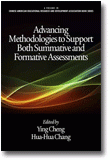
Advancing Methodologies to Support Both Summative and Formative Assessments
Edited by:
Ying Cheng, University of Notre Dame
Hua-Hua Chang, University of Illinois at Urbana-Champaign
A volume in the series: Chinese American Educational Research and Development Association Book Series. Editor(s): Guofang Wan, Loyola University Chicago.
Published 2014
Over the past thirty years, student assessment has become an increasingly important component of public education. A variety of methodologies in testing have been developed to obtain and interpret the wealth of assessment outcomes. As assessment goals are getting increasingly multifaceted, new testing methodologies are called for to provide more accessible and reliable information on more complex constructs or processes, such as students' critical thinking and problem-solving skills.
Testing methodologies are needed to extract information from assessments on such complicated skills, in order to advise teachers about certain areas of students that need intervention. It is even a bigger challenge, and a vital mission of today’s large-scale assessments, to gain such information from testing data in an efficient manner. For example PARCC and Smarter Balanced Assessments consortia are both striving to offer formative assessments through individualized, tailored testing. The book provides state-of-the-art coverage on new methodologies to support tradit ional summative assessment, and more importantly, for emerging formative assessments.
CONTENTS
Part I: Advances in making testing more efficient. 1. Review on automated test assembly -- Dmitry Belov & Pei-Hua Chen. 2. Automated test assembly in multi-stage testing -- Yi Zheng 3. Repeated testing in clinical trials and its implications to educational assessments -- Yi Cheng & Ying Cheng. Part II: Advances in gaining information on/from test items 4. Review of online calibration using IRT models -- Hao Ren & Qi Diao. 5. Impact of calibration error on applications of IRT -- Jeffrey Patton & Ying Cheng. 6. Optimal item weighting -- Jian Tao. Part III: Formative Assessment: Gaining diagnostic information by having subdimensions and subscores 7. Dimensionality detection -- Jinming Zhang. 8. Subscore reporting through multidimensional IRT modeling -- ihua Yao. 9. Review on multidimensional CAT -- Chun Wang. 10. Multidimensional Rasch models -- Wen-Chung Wang. Part IV: Formative Assessment: Gaining diagnostic information by cognitive diagnostic modeling 11. Large scale implementation of cognitive diagnosis in China -- Hongyun Liu. 12. Online calibration using cognitive diagnostic models -- Ping Chen & Tao Xin. 13. Person fit analysis in cognitive diagnostic assessments -- Ying Cui. 14. An application of the fusion cognitive diagnostic model to a large-scale state assessment -- Meghan McGlohen, Edward Miller & Hua-Hua Chang
-
Paperback9781623965952
Web price: $45.04 (Reg. 52.99)
-
Hardcover9781623965969
Web price: $80.74 (Reg. 94.99)
- eBook9781623965976

- EDU030000 - EDUCATION: Testing & Measurement
- EDU011000 - EDUCATION: Evaluation & Assessment
- EDU037000 - EDUCATION: Research
-
 Critical Issues in Early Childhood Teacher Education
Volume 2-International Perspectives
Critical Issues in Early Childhood Teacher Education
Volume 2-International Perspectives
-
 Critical Issues in Early Childhood Teacher Education
Volume 1 - US Perspectives
Critical Issues in Early Childhood Teacher Education
Volume 1 - US Perspectives
-
 Gifted Education in Asia
Problems and Prospects
Gifted Education in Asia
Problems and Prospects
-
 Model Minority Myth Revisited
An Interdisciplinary Approach to Demystifying Asian American Educational Experiences
Model Minority Myth Revisited
An Interdisciplinary Approach to Demystifying Asian American Educational Experiences
-
 Rekindling Embers of the Soul
An Examination of Spirituality Issues Relating to Teacher Education
Rekindling Embers of the Soul
An Examination of Spirituality Issues Relating to Teacher Education
-
 Teaching and Learning Chinese
Issues and Perspectives
Teaching and Learning Chinese
Issues and Perspectives
-
 Teaching English Language Learners with Exceptionalities
A Collection of Research-Based Practices
Teaching English Language Learners with Exceptionalities
A Collection of Research-Based Practices

